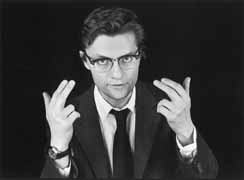
ROBERT HICKS
Re-evaluating Will Eno's "Thom Pain (based on nothing)"
April 2005
DR2 Theatre, 103 East 15th Street
Tues.-Fri. 8:00 pm; Sat. 6:00, 9:00 pm; Sun. 3:00, 7:00 pm
$45
buy
Tickets to Thom Pain (based on nothing)
Extended through Sept. 4, 2005
Reviewed by Robert Hicks on April 14, 2005
 |
| James Urbaniak in "Thom Pain." Photo by James Hamilton. |
Brooklyn playwright Will Eno is no Samuel Beckett - even for a generation raised on the deadpan, political satire of Jon Stewart.
Eno does offer some interesting observations on anxiety and fear as well as the slights, foibles and enduring pain one encounters from childhood to adult life in his one-man show "Thom Pain (based on nothing)" now playing at DR2 Theatre in Union Square in Manhattan through Sept. 4, 2005.
James Urbaniak, who portrays the narrator Thom Pain, is a cunning trickster and a darkly playful game show-like host who flirts with engaging his audience on a personal level while bemusing them with his tongue-in-cheek black humor and sardonically commenting on their patience with him and with life.
His monologue can be fitful, engaging and (yes, sometimes painfully boring) with its stops and starts and its efforts to retrace the memories of a childhood full of loss and the impact of that past on the romantic heartbreak and loneliness of adult life.
As the show's sole voice, Urbaniak toys with his audience, playing games with our fear of the dark, with our need to see the face of a person talking to us. He builds our expectations of winning a raffle only to cast uncertainty on the very existence of a raffle. He mocks stage conventions when he cues the lighting designer to give him some light as he stands alone in a dark shadow next to the stage. He wanders into the audience asking for volunteers to join him on stage, creating anxiety in those with stage fright and anticipation for those who desire to be in the spotlight. Then he recants on his invitation. Later, he does bring a man on stage, not to engage him in tomfoolery, but to leave him in the dark so to speak with his eyes closed. When the man does not leave the stage, the narrator sarcastically comments on his patience and menaces him with stares and startling boos.
Eno's words afford Thom Pain the opportunity to experiment with the rhythms of language, but, unlike Beckett and Gertrude Stein, not in a manner that leaves us questioning fundamental principles of logic and thought. Eno's language does revel in life's indignities and its empty promises and the playwright's greatest observation perhaps is that even the ordinary places where we seek beauty (a flower, a love relationship) are fraught with hidden pain, but he really offers no profound insights concerning the human condition and life.
What "Thom Pain (based on nothing)" does achieve is an unseemly
gamesmanship regarding one's notions of show business, stand-up comedy, memory,
the comforts of normal social interaction, existential angst and the instability
of self-identity. It's not a deeply moving theatrical experience, but certainly
one worth seeing and one that in hindsight provokes thought about our sources
of anxiety, fear and pain. Unlike Beckett, though, Eno never really explores
deeply the justifications we create for ourselves to help us overcome anxiety,
fear and pain and go on with life. [Hicks]
| museums | NYTW mail | recordings | coupons | classified |
